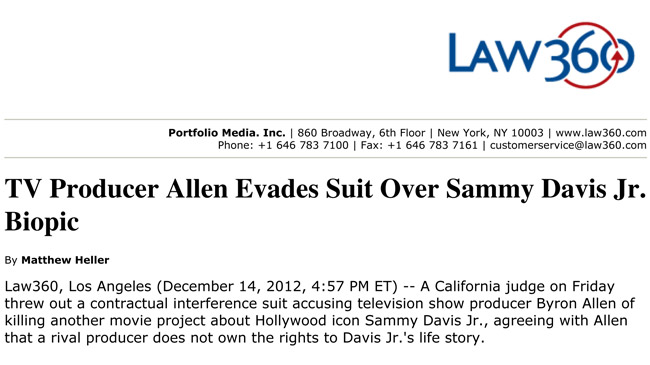By Matthew Heller
Law360, Los Angeles (December 14, 2012, 4:57 PM ET) — A California judge on Friday threw out a contractual interference suit accusing television show producer Byron Allen of killing another movie project about Hollywood icon Sammy Davis Jr., agreeing with Allen that a rival producer does not own the rights to Davis Jr.’s life story.
Los Angeles Superior Court Judge Susan Bryant-Deason granted Allen’s anti-Strategic Lawsuits Against Public Participation motion to dismiss two interference claims and sustained demurrers to two others arising out of a February 2011 deal the other producer, Rick Appling, made with Davis Jr.’s daughter that he said assigned him the rights to make the biopic. Appling filed suit in September after Allen announced his Entertainment Studios company had acquired life rights from Tracey Davis.
Allen’s attorney Louis “Skip” Miller told the judge that Appling’s deal was only for the rights to two books authored by Tracey Davis and he had no basis for claiming a more extensive license for her father’s name, likeness and life story.
“We’re really not in conflict at all,” Miller said. “We’re not using those books.”
Appling’s attorney Michael Shapiro urged Judge Bryant-Deason to delay deciding whether to dismiss the case until he had conducted some discovery, including a deposition of Tracey Davis.
“The court cannot at this point in time interpret [her] agreement” with Appling, he said.
But the judge suggested Appling should have sued Tracey Davis. “I don’t understand why she is not in the case,” she said.
In his deal with Tracey Davis, Appling acquired an option on her books “Sammy Davis Jr.: My Father” and “Yes I Can: Sammy Davis Jr.” at an upfront cost of $10,000. Future payments, contingent on the option being extended and a feature film being made, amounted to $275,000.
Appling claimed in his suit that he was in talks with actor Leonardo DiCaprio’s Appian Way Productions regarding a Davis Jr. film but Allen’s statement was a “deal killer,” chilling the interest of his coproducers Invasion TV and Ampersand Media.
According to Allen, Tracey Davis had agreed to act as a consultant on his project. “On his deathbed, one of the last things my father told me was: ‘Tracey, tell me story, warts and all,'” she told Variety. “Byron Allen, who knew and worked with my father, is the perfect producer to help my family and I achieve my father;s dying wish.”
In court papers, Shapiro said his client had not only acquired the rights to the books but also to “Tracey Davis’ memory and participation in the development of the project.” However, he did not make that argument at Friday’s hearing.
“In plaintiff has a problem with somebody, it’s not us,” Miller told the court. “We didn’t do anything wrong.”
Judge Bryant-Deason dismissed claims for tortious interference with contract and intentional interference with prospective economic advantage under the anti-SLAPP law. The reaminging claims for tortious interference with prospective contractual relations and declaratory relief were dismissed on demurrers but the judge gave Appling leave to amend those claims.
Appling is represented by Michael R. Shapiro.
Allen and Entertainment Studios are represented by Louis R. “Skip” Miller and Adam B. Hagen of Miller Barondess LLP.
The case is Rick Alling v. Byron Allen et at., case number BC492192, in the Superior Court of the State of California, County of Los Angeles.
–Additional reporting by Jonathan Randles. Editing by Chris Yates.

